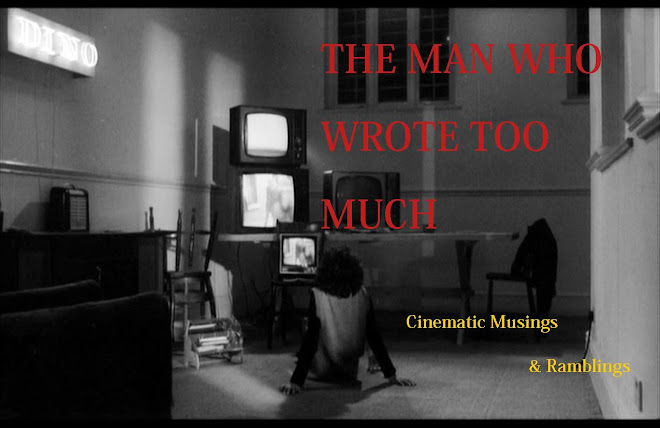The film follows Robert (David Beames), a late night factory DJ in London, who after we have followed him listlessly attending to his daily routine for a while, is informed that his brother has died mysteriously in Bristol. Robert therefore decides to take a road trip to Bristol to deal with any matters that may need clearing up.
+1.JPG)
Rather than the embrace of the road as a site of freedom and mobility as seen in the American road movie, (even the existentialist malaise ridden classic that is Monte Hellman’s Two Lane Blacktop (1971) had a free spirit and the excitement of the never ending highway). Radio On is a distinctly British take on the genre, this is a place where the road will soon come to an end, the endless horizons replaced with concrete wastelands (echoes of J.G. Ballard are numerous and clearly intentional) and utilitarian motorways. Even when our protagonist reaches the countryside he faces an unwelcoming hibernal bleakness still stuck sometime in the mid 1950’s. this is On the Road as written by Orwell instead of Kerouac.
The car as well as being symbolic of the freedom of the open road can just as easily be turned inward into an examination of alienation, the car as an autonomous unit, a metallic lump of detachment, who needs to communicate anymore when we have our own private space in which to hide even when travelling?
+2.JPG)
And so this struggle to communicate becomes the films central metaphor. The film’s opening scenes present a dystopian London crumbling under the weight of government mismanagement. Our protagonist attending to his job as a factory DJ, alone in his booth playing music to uninterested factory workers, non-descript in their identical white overalls. It’s in image of alienation as potent as anything seen in Antonioni’s work.
The theme continues throughout, our protagonist making diminutive attempts to connect with other equally displaced characters on his journey. An Army deserter, a German woman looking for her daughter and even a young Sting as an obsessive Eddie Cochran fan living out of a caravan in a desolate petrol station.
The central narrative of the dead brother in the end proves to be somewhat of an enigmatic macguffin, an incidental event to allow the narrative to propel forwards. Though the narrative appears to matter little if at all to Petit, who instead concentrates the film’s energies on a veneration of the image and the soundtrack.
+3.JPG)
His mise-en-scene of a pre-Thatcherite Britain in post industrial decline (filmed in startling high contrast by Wenders regular cinematographer of the time, Martin Schafer) is backed by a Teutonic futurist soundtrack of Kraftwerk and Berlin era Bowie. Even that ode to youthful rebellion that is “(I Can’t Get No) Satisfaction” is presented in a disjointed and fractured way by virtue of its Devo cover version, draining away any hint of youthful abandonment.
Petit doesn’t appear to select the songs for their suitability within the image, if anything it seems to be the other way round. The images are an excuse for the songs, which are often presented in their full versions. For example check out the audacity of him having Robert sit virtually motionless in a pub for three minutes just so we can hear all of Wreckless Eric’s touching punk by way of 50’s teen bop romancer that is “Whole Wide World” on the jukebox. Hell, even the film’s title is taken from a Modern Lovers lyric.
Overall then, a magnificent film for the worshiper of the image as god, aesthetically this is an exceptional film and about as close to a real ‘road movie’ as British cinema can get. It will surely find favour with fans of Antonioni, Two Lane Blacktop and early Wenders.

If Ian Curtis had watched "Saturday Night Fever" during the recording sessions of 1979's "Unknown Pleasures" and had suddenly decided to turn away from his music and become a film director instead, the result most likely would of been something very much along the lines of this film.
ReplyDeleteIt is fascinating to note, as per "Fever", two significant details in "Radio On" that few people would ever recognize as a filmic connection: the disco-suited patron denied entry to the new-wave rock club, and the ending at the quarry, where the Rover hovers precariously at the edge of a dangerous precipice, akin to the now iconic concluding sequence of accidental/suicidal death in "Fever" from the monolithic heights of the Verrazano-Narrows Bridge.
"These are the frozen years", indeed. And it certainly is about as close to being a cinematic and visual evocation of Joy Division's lyrics and music as any late 70's independent film made in England could ever hope to be. And there is a grave mistake in the above description of any allusions to "Saturday Night Fever". The protagonist enters into a disco, not a new wave club, and appears to be turned away due to his "punk look" violating the disco's dress code, made clear by the admittance of a patron in a Travolta-like white suit and bellbottoms.
Delete